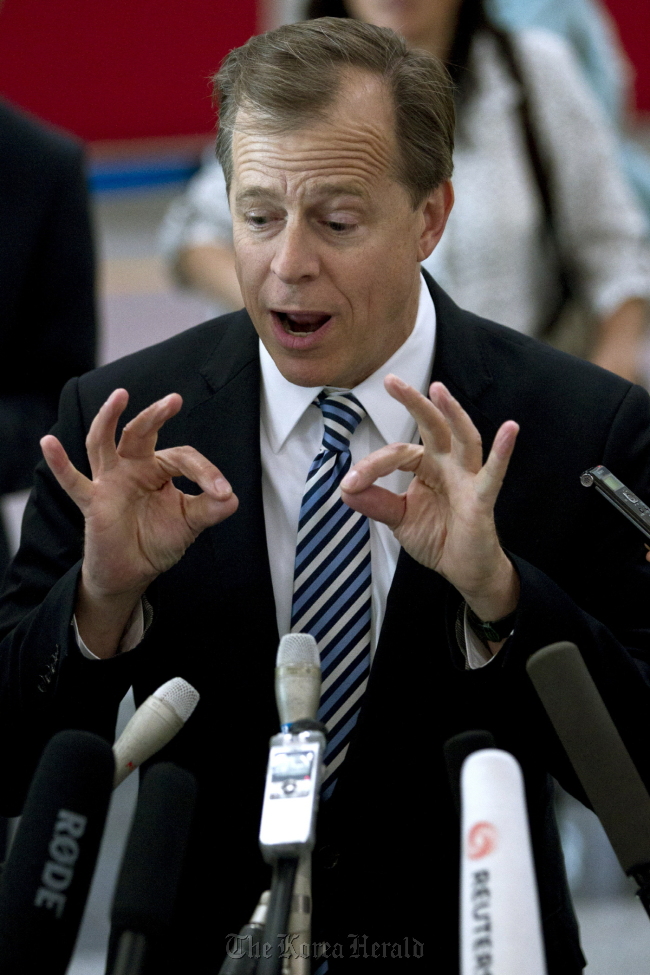N.K., U.S. signal openness to diplomatic solutions
By Shin Hyon-heePublished : May 24, 2012 - 19:47
North Korea and the United States are walking a tightrope on signaling willingness to defuse tension diplomatically following Pyongyang’s firing of a long-range rocket last month.
U.S. officials said Wednesday that Washington will consider offering food aid to Pyongyang if the destitute country changes course and makes no additional provocations.
While portraying its nuclear program as a “self-defense” measure, the North said Tuesday it has no plan for an atomic test for now and remains open to dialogue.
“I think the precondition is that North Koreans has to demonstrate that it is going to refrain from those types of provocative actions and they are serious about moving in a different direction,” Ben Rhodes, deputy national security adviser for strategic communications at the White House, told a news conference in Washington.
Glyn Davies, U.S. special envoy on North Korea, indicated Wednesday that food assistance may return to the table if the North changes its attitude.
“I think, as you all know, the United States has been historically very generous when it comes to the provision of nutritional assistance,” Davies told reporters in Beijing after meetings with his counterpart Wu Dawei and other Chinese officials. He also met with Lim Sung-nam of South Korea and Shinsuke Sugiyama of Japan in Seoul on Monday.
“And should the opportunity present itself, if we can reach a stage where we can once again have faith in the North Koreans’ ability to abide by its undertakings and its promises, we would like very much to get back to the provision of nutritional assistance,” he added.
U.S. officials said Wednesday that Washington will consider offering food aid to Pyongyang if the destitute country changes course and makes no additional provocations.
While portraying its nuclear program as a “self-defense” measure, the North said Tuesday it has no plan for an atomic test for now and remains open to dialogue.
“I think the precondition is that North Koreans has to demonstrate that it is going to refrain from those types of provocative actions and they are serious about moving in a different direction,” Ben Rhodes, deputy national security adviser for strategic communications at the White House, told a news conference in Washington.
Glyn Davies, U.S. special envoy on North Korea, indicated Wednesday that food assistance may return to the table if the North changes its attitude.
“I think, as you all know, the United States has been historically very generous when it comes to the provision of nutritional assistance,” Davies told reporters in Beijing after meetings with his counterpart Wu Dawei and other Chinese officials. He also met with Lim Sung-nam of South Korea and Shinsuke Sugiyama of Japan in Seoul on Monday.
“And should the opportunity present itself, if we can reach a stage where we can once again have faith in the North Koreans’ ability to abide by its undertakings and its promises, we would like very much to get back to the provision of nutritional assistance,” he added.

Koh Yu-hwan, a North Korea professor at Dongguk University in Seoul, said North Korean leader Kim Jong-un should feel the need to ease the tension to ensure a soft landing for his fledgling regime.
“Both North Korea and the U.S. are now groping for ways to pursue talks, rather than confrontation, within the bounds of international settlements,” he told The Korea Herald.
Bonnie Glaser, a China expert at the Center for Strategic and International Studies in Washington, cautioned against hasty assumptions, citing “so many variables involved.”
“The pattern of this issue in the past is that the international community seeks to punish North Korea with U.N. sanctions (after rocket launches and nuclear tests), but eventually returns to the negotiating table,” she said in an e-mail.
Speculation is rising that senior U.S. officials made a secret visit to Pyongyang a week before the April 13 launch in an apparent bid to dissuade the authoritarian regime from the plan.
Chosun Ilbo cited diplomatic sources as saying that a U.S. Air Force Boeing 737 flew from Guam to Pyongyang on Apr. 7, carrying Sydney Seiler, a National Security Council adviser to President Barack Obama, and Joseph DeTrani, director of the National Counterproliferation Center.
DeTrani arranged former U.S. President Bill Clinton’s trip to Pyongyang in August 2009 to help release two female American journalists.
Foreign Ministry spokesperson Cho Byung-jae and State Department spokesperson Victoria Nuland refused to comment.
The failed rocket triggered the revocation of the so-called Leap Day Deal between Pyongyang and Washington. The cash-strapped North agreed on Feb. 29 to put a moratorium on its nuclear and missile programs in exchange for 240,000 tons of food aid.
Still, tensions remain high on the Korean Peninsula. New satellite imagery suggests that North Korea has recently upgraded its old rocket launch site in the northeastern town of Musudan and undertaken mining and excavation activity at its nuclear test site in Punggye.
“We no longer have any confidence in any of the commitments that they’ve made since they’ve already abrogated the major ones. So I’m not sure what there is to implement, given the fact that North Korea itself started this process of abrogation,” Nuland said at a press briefing on Tuesday.
Hong Hyun-ik, a senior researcher at Sejong Institute, said the two sides are trying to put their relationship back into orbit and run their dialogue channels again.
“It has actually never left its orbit but has simply been through a seemingly cooling-off period. There will come soon moves toward a new round of six-party talks or a bilateral meeting,” he said.
By Shin Hyon-hee (heeshin@heraldcorp.com)







![[KH Explains] Hyundai's full hybrid edge to pay off amid slow transition to pure EVs](http://res.heraldm.com/phpwas/restmb_idxmake.php?idx=644&simg=/content/image/2024/04/18/20240418050645_0.jpg&u=20240419100350)






![[From the Scene] Monks, Buddhists hail return of remains of Buddhas](http://res.heraldm.com/phpwas/restmb_idxmake.php?idx=652&simg=/content/image/2024/04/19/20240419050617_0.jpg&u=20240419175937)

![[KH Explains] Hyundai's full hybrid edge to pay off amid slow transition to pure EVs](http://res.heraldm.com/phpwas/restmb_idxmake.php?idx=652&simg=/content/image/2024/04/18/20240418050645_0.jpg&u=20240419100350)

![[Today’s K-pop] Illit drops debut single remix](http://res.heraldm.com/phpwas/restmb_idxmake.php?idx=642&simg=/content/image/2024/04/19/20240419050612_0.jpg&u=)